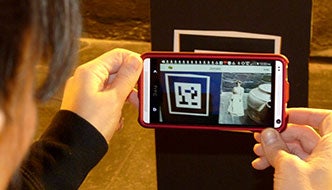A mid the 19th-century row houses in the Second Street Historic District in downtown Troy sits a white marble house, completed in 1827, just as Troy was beginning to shift from a commercial to an industrial economy base. The Hart-Cluett House, as it is known today, was constructed for a businessman-banker’s family, the Harts, and sold six decades later to the Cluett family, who helped give Troy the nickname “The Collar City.” On Wednesday, Oct. 21, beginning at 4 p.m., visitors will have an opportunity to explore Below Stairs, an interactive augmented-reality role-playing tour developed by Assistant Professor Rebecca Rouse, in collaboration with the Rensselaer County Historical Society (RCHS).

Rebecca Rouse
The launch of Below Stairs comes at a time when museums are exploring digital and mobile technologies to enhance the visitor experience. The augmented-reality (AR) project allows visitors to play the role of a new servant in the Hart-Cluett House during the 1850s, working on a first day of trial employment. In order to secure a permanent position in the household, the new servant must execute a series of tasks assigned to them by the Harts’ cook. These tasks include the delivery and retrieval of a variety of historic objects from various locations in the house, such as delivering a cup of tea to a member of the family, and fetching a chamber pot for emptying and cleaning.
“As opposed to conventional tour experiences, Below Stairs requires significant physical effort in terms of participation from visitors,” said Rouse, assistant professor in the Department of Communication and Media. “The process of moving through the site of the house, up and down several flights of stairs many times, is necessary to move the experience forward on a procedural level. More importantly, this physically engaged movement through the site becomes a meaning-making process for visitors.”
Rouse also noted that by experiencing actions in the house through their mobile devices, visitors are able to interact virtually with digital versions of physical objects that cannot be touched due to preservation concerns.

The augmented-reality project allows visitors to play the role of a new servant in the Hart-Cluett House during the 1850s, working on a first day of trial employment. The new servant must execute a series of tasks assigned to them by the Harts’ cook.
“Our Below Stairs Augmented-Reality Tour brings an innovative experience to the venerable Hart-Cluett House Museum. This well-designed app marries experiential fun with historical accuracy to best showcase a slice of local history,” said Karin Krasevac-Lenz, RCHS executive director.
The Below Stairs project originated in a spring 2014 special topics course titled Mobile Augmented-Reality Design, in which students worked in teams to develop prototypes for RCHS while learning an interdisciplinary approach to AR and user-centered design. The project was further developed for public release this fall, with significant contributions from Kate Tyrol, a Ph.D. student in the Department of Science and Technology Studies, and Jacky Doll ’15, who was pursuing a master’s degree in human-computer interaction (H.C.I.).

Interior of the Hart-Cluett House, a mid 19th-century row house in the Second Street Historic District in downtown Troy, completed in 1827.
“I think this type of project is just going to get better and better,” said Doll, who assisted in script writing, user experience survey design, and video and graphic editing for the project. “It’s creative, fun, and focused on learning new things about people and technology. The look is unique, with funny voices playing against hand-drawn characters.” Doll graduated in May 2015 and now works at IBM.
Additional team members who worked on the project included Leo Antelyes, Sebastian Basch, Jason Coley, John Grover, Sarabeth Jaffe, Irene Khan, Leslie King, Raven Kwok, Nick Lewis, and Doris Xian.
“This project is a wonderful way to see the creativity that students possess and how they can stretch themselves,” Rouse said. “Most important, for me, this project has served to establish a connection between our classes in HASS and the Troy community. I believe that there are so many opportunities for us to explore service-learning projects with other venues in the city of Troy so that we can develop additional humanities-based approaches to mixed-reality design.”
In spring 2016, Rouse will be offering a new course co-created with Distinguished Research Professor of Music Pauline Oliveros, titled Mixed Reality Stage Design.
Note: The Hart-Cluett House is located at 59 Second Street in downtown Troy. To participate, you will need a mobile device or tablet that is running iOS5, Android, JellyBean, or above. Visit the Apple App Store or the Google Play Store to download the “Junaio” augmented-reality app for free.


